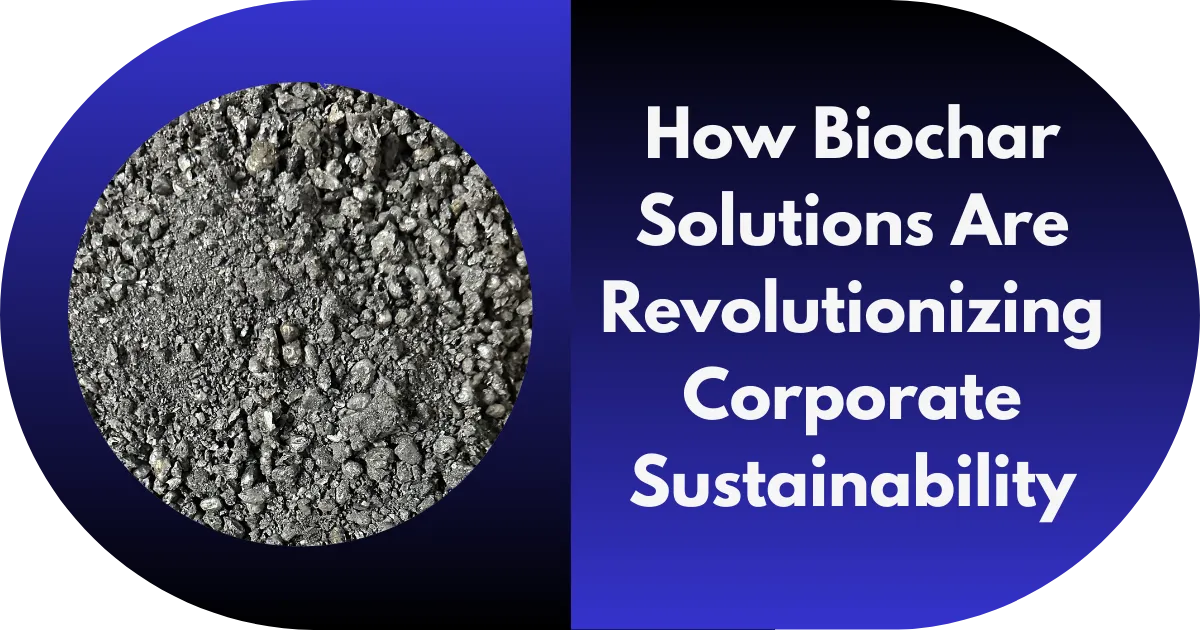Biochar solutions, a carbon-negative technology derived from organic waste, are rapidly becoming a cornerstone of corporate sustainability strategies. Fortune 500 companies are leveraging biochar to significantly reduce their carbon footprints, enhance soil health, and meet stringent ESG goals. With scalable production, blockchain verification, and measurable climate impact, biochar solutions offer a compelling pathway toward genuine environmental stewardship.

In the race to achieve net-zero emissions, Fortune 500 companies face mounting pressure from investors, regulators, and consumers alike. Sustainability executives are tasked with navigating a complex landscape of carbon offsets, renewable energy credits, and emerging technologies. Amidst this complexity, biochar solutions have quietly emerged as one of the most promising and scalable carbon sequestration strategies available today.
But what exactly is biochar, and why is it rapidly gaining traction among corporate sustainability leaders?
Biochar: Ancient Wisdom Meets Modern Innovation
Biochar is a stable, carbon-rich material produced through pyrolysis—the thermal decomposition of organic matter in an oxygen-limited environment. Historically, indigenous communities in the Amazon basin utilized biochar-like substances to enrich soils, creating fertile “terra preta” that remains productive centuries later. Today, companies like Dynamic Carbon Credits have modernized this ancient practice, transforming agricultural residues, genetically optimized biomass, and non-food organic waste into high-quality biochar at industrial scales.
Dynamic Carbon Credits alone operates across more than 800,000 acres in 26 U.S. states, producing over 25,000 pounds of biochar per hour. This scale positions biochar solutions as a viable, impactful strategy for corporations aiming to meet ambitious sustainability targets.
Why Biochar Solutions Matter for Corporate Sustainability
Corporate sustainability executives face significant challenges when selecting carbon offset strategies. Traditional offsets often raise concerns about authenticity, permanence, and potential greenwashing. Biochar solutions address these issues head-on:
- Permanent Carbon Sequestration
Unlike traditional forestry-based offsets, biochar provides long-term carbon storage. When organic matter is converted into biochar, carbon is locked away in a stable form for hundreds or even thousands of years. According to recent studies, biochar can sequester carbon effectively for centuries, providing corporations with verifiable and permanent carbon removal. - Soil Health and Agricultural Productivity
Biochar isn’t just about carbon sequestration—it’s also a powerful soil amendment. When incorporated into agricultural soils, biochar enhances water retention, nutrient availability, and microbial activity. This leads to improved crop yields, reduced fertilizer use, and increased resilience against drought and climate variability. For corporations with agricultural supply chains, biochar solutions offer dual benefits: carbon reduction and tangible improvements in productivity and sustainability. - Methane Emission Reduction
Methane (CH4) is a potent greenhouse gas with a global warming potential significantly higher than carbon dioxide (CO2). Dynamic Carbon Credits emphasizes biochar production methods that capture and sequester methane emissions from organic waste streams. By addressing both CO2 and CH4 emissions simultaneously, biochar solutions provide corporations with a comprehensive approach to greenhouse gas reduction.
Blockchain Verification: Ensuring Transparency and Trust
One of the most pressing challenges in the carbon credit market is ensuring transparency and authenticity. Dynamic Carbon Credits has partnered with Northern Trust to integrate blockchain technology into their biochar solutions. Blockchain provides immutable, transparent records of carbon sequestration activities, enabling real-time verification and reporting.
This innovation addresses a critical pain point for corporate sustainability executives: the need for verifiable, trustworthy carbon credits. Blockchain-backed biochar solutions eliminate ambiguity and significantly reduce the risk of greenwashing accusations, empowering corporations to confidently communicate their sustainability achievements to stakeholders.
Real-World Impact: Fortune 500 Companies Leading the Way
Several Fortune 500 companies have already integrated biochar solutions into their sustainability strategies, achieving measurable results:
- A leading global technology firm incorporated biochar into its data center landscaping projects, achieving a 30% reduction in water usage and measurable carbon sequestration benefits.
- A major consumer goods manufacturer utilized biochar amendments across its agricultural supply chain, reducing fertilizer inputs by 25% and significantly lowering its Scope 3 emissions.
- An international financial institution leveraged blockchain-verified biochar credits to transparently offset its operational emissions, enhancing its ESG ratings and investor confidence.
These examples underscore biochar’s versatility and effectiveness across diverse industries, demonstrating its potential as a scalable solution for corporate sustainability.
Overcoming Barriers to Adoption
Despite clear benefits, some barriers remain. Awareness and understanding of biochar solutions are still emerging among corporate decision-makers. Additionally, the initial investment required for large-scale biochar production infrastructure can be significant. However, as regulatory pressures increase and carbon markets mature, the economic case for biochar solutions grows stronger.
Dynamic Carbon Credits and similar innovators are actively working to educate corporate sustainability leaders, streamline implementation processes, and demonstrate clear ROI through pilot programs and case studies.
The Future of Biochar Solutions in Corporate Sustainability
As Fortune 500 companies intensify their commitments to net-zero emissions and ESG excellence, biochar solutions are poised to play an increasingly central role. With proven scalability, permanent carbon sequestration, soil health benefits, and blockchain-enabled transparency, biochar represents a robust, credible pathway toward genuine sustainability leadership.
Corporate sustainability executives seeking impactful, verifiable carbon reduction strategies would be wise to explore biochar solutions now—before competitors seize the advantage.
Ready to explore how biochar solutions can transform your sustainability strategy?
Connect with Dynamic Carbon Credits today for a personalized consultation.
Take Action Today!
Ready to integrate biochar solutions into your corporate sustainability strategy? Reach out to Dynamic Carbon Credits for a full consultation on how our industrial-scale biochar production can help you achieve tangible carbon reductions, address methane worries, and propel your company further down the path to net-zero.

